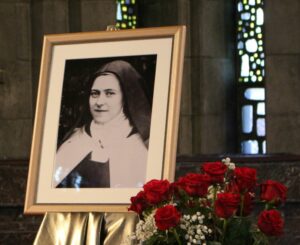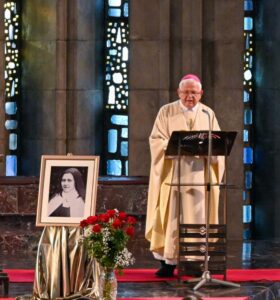
Gratitude for the Life Traces and Faith
of Little St. Teresa
In a Eucharistic celebration on the evening of June 10, an opportunity was given to thank God for the “shower of roses,” for the graces that the Little St. Teresa imparted right from the beginning of her visit at the Liebfrauenhoehe, Germany. Auxiliary Bishop Johannes Kreider presided at the liturgy. He substituted on short notice for Pastor Franz Xaver Weber who was unable to attend due to illness. “I gladly come,” emphasized Auxiliary Bishop Kreidler, who officiated at two Holy Masses on this day.
“In this Eucharistic celebration we want to conscientiously give thanks for the life traces and faith of the Little St. Teresa. She mirrored the mystery of Jesus’ life and death in her life, indeed in her person.” Thus Auxiliary Bishop Kreidler set the tone for the Holy Mass.
Teresa’s vocation in life was a vocation to love
In his address Auxiliary Bishop Kreidler stated: “If a person wanted to characterize Teresa’s life with a summarizing word, one could perhaps say: Teresa’s vocation in life was a vocation to love. This vocation came to her while she was meditating on the Song of Songs in the First Letter to the Corinthians. This passage from the Bible urged her to exclaim: ‘O Jesus, my love … at last I have found my vocation! My vocation is love! Yes, I have found my place in the Church and, you my God, have given me this place.'”
Great love lived in the little way
Auxiliary Bishop Kreidler went on to speak of different facets of the life of the Little St. Teresa:
“Teresa is for me a saint of a great love, which she lived in her little way; a saint who was filled with love of God and could speak of it almost rapturously; a saint who put into practice her response of love to God, that is, love of neighbor, in the simple and everyday situations of life in a cloistered convent. She herself wrote about this: ‘Love is paid only with love; love is answered only by love.’ Are these not valuable spiritual insights for our lives?“
Jugde others lovingly
In doing so, Teresa doesn’t make the answer of love an overwhelming feat. With her, it’s not the outward measurable action that counts. Rather, personal disposition determines the measure of love and devotion for everyone. Teresa assesses with great sensitivity and understanding what each person is capable of living. ‘One must always judge the other lovingly‚’ she would later urge as novice mistress, ‘because what appears in our eyes as negligence is often and very often an heroic deed in the eyes of God.’
Grasping the presence of eternal love with your hands
The theologian Hans Urs von Balthasar has very beautifully characterized St. Teresa’s love as with love and out of love: ‘Here one grasps with one’s hands the Presence of an Eternal Love that soothes and reconciles the natural finitenesses of human life, indeed virtually suspends it, to allow what is humanly exclusive to be simultaneously the enthusiasm of girlhood and prudence and restraint, softness with hardness, devotion with planning, filial obedience with the keen eye of the deputy novice mistress, the need for human love with the demands of Carmelite solitude …’
Teresa’s impulse for us: I am desired by God and loved by God
What does that mean for us? Teresa would tell us: First of all, it’s not about your life, your activity; first of all, it is about believing God, about the love he has for us. We Christians–and especially Christians in service to the Church—often ask first of all: What do I have to do? Jesus and saints like Teresa point the Church in a dfferent direction. They invite us to ask first of all: Who may I be when I am with God? And her answer is: “Someone who is absolutely wanted and loved.”
